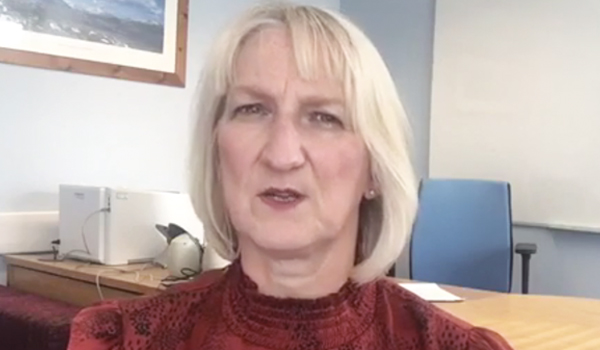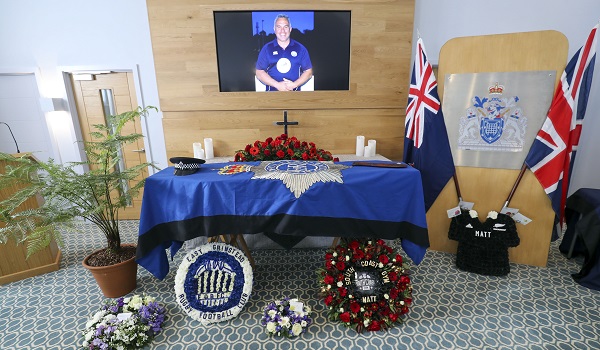Nurse-led custody healthcare ‘positive evidence’ of progress
A new nurse-led pilot of healthcare provision in police custody suites is a “positive” step in the wellbeing of detainees, according to a new report on custody arrangements in Northern Ireland.
An inspection by the Criminal Justice Inspection Northern Ireland (CJI) and the Regulation and Quality Improvement Authority (RQIA) said the pilot at Musgrave custody suite in Belfast provides “positive evidence of what can be achieved when the Police Service of Northern Ireland (PSNI) and health and social care trusts work together”.
Inspectors have now recommended that nurse-led health custody care provision is rolled out across Northern Ireland.
Jacqui Durkin, Chief Inspector of Criminal Justice in Northern Ireland, said: “The introduction of this new model had strengthened oversight and accountability arrangements for healthcare staff in Belfast and helped address weaknesses in clinical governance highlighted by CJI and RQIA inspectors in previous police custody inspections.”
The pilot at Musgrave custody is being run in partnership with the Belfast Health and Social Care Trust and the Public Health Agency.
Ms Durkin said: “It focuses on the health and wellbeing of the detained person, providing signposting to mental health and addiction interventions and pathways as well as the essential service required within the custody environment.
“The Musgrave healthcare pilot provides positive evidence of what can be achieved when the PSNI and health and social care trusts work together. We have recommended that the implementation of a nurse-led custody model of healthcare provision is progressed in police custody suites across Northern Ireland.
“This would help ensure consistency around healthcare practice, access to medical records and address inconsistencies in the storage and management of medicines and medical equipment.”
The inspection by the CJI and RQIA examined how detainees were treated while in police custody and the conditions in which they were held to ensure the PSNI’s legal obligations and human rights standards were being met.
“This inspection found that progress had been made since our last inspection in 2016 to improve the governance arrangements and the strategic management of police custody,” said Ms Durkin.
“Every day PSNI officers, police staff and healthcare colleagues working in police custody deal with numerous detainees, all who have individual needs, many who have a complex range of mental health, alcohol and substance misuse and behaviour issues.
“Effectively engaging with each person who comes into their care to ensure their immediate physical and mental health needs are met and they are held safely and securely, presents a constantly challenging work environment.”
She said training provided to police officers and staff working in custody suites across Northern Ireland had a focus on vulnerability and during fieldwork for this inspection, inspectors saw examples of custody staff who were skilled and experienced in dealing with distressed, intoxicated and challenging people and circumstances.
However, inspectors found challenges in relation to dealing with children and young people from a ‘looked after’ or care-experienced background that were identified in previous inspection reports needed to be “urgently addressed”.
‘Looked after’ children were more likely to be brought to police custody than young people living with their parents or guardians and were more likely to be held in police custody for longer periods of time.
“A police cell is a daunting place for anyone, never mind a child in the care system,” said Ms Durkin.
“The longstanding issues of why these children are more likely to be in police custody, are held longer than their peers and their rights to bail need to be urgently addressed. We have recommended the Department of Justice prioritise the legislative reform that is needed.
“We have also recommended that discussions between the PSNI and health and social care partners to address the issue of ‘looked after’ children being held in police custody cells, which had previously stalled, should recommence within the next three months.”
The report makes six strategic and seven operational recommendations which, if implemented, Ms Durkin said would help secure further improvements and the better delivery of police custody arrangements in Northern Ireland in the future.
Strategic recommendations
- The Department of Justice should prioritise and secure support for required legislative reform to:
- implement longstanding Northern Ireland Law Commission recommendations on the right to bail for children and young people; and
- make changes to the Police and Criminal Evidence (Northern Ireland) Order 1989 which make provisions for alternative accommodation for children charged with an offence and provide clarity for custody officers on the detention of children and young people.
- The PSNI should re-establish strategic discussions with health and social care partners to address the issue of ‘looked after’ children being held in police custody cells. This should commence within three months of the publication of this report.
- The PSNI and health and social care trusts should collaborate effectively to expedite the implementation of the nurse-led custody model across Northern Ireland with interdepartmental strategic support.
- Systems should be developed and implemented at both operational and senior managerial level within the PSNI and the Belfast Health and Social Care Trust for the joint analysis of incidents/complaints by healthcare professionals/forensic medical officers (FMOs) to ensure that learning is identified and shared both between the PSNI and health care staff and between healthcare staff and forensic medical officers across all custody suites.
- The PSNI should develop and implement systems through locality/district-based administrative FMOs, responsible officers at the Health and Social Care Board and through the General Medical Council for resolving professional practice concerns or complaints. These systems should focus on continuous improvement in quality and ensuring consistency in respect of the services provided.
- The PSNI and healthcare providers should define the current arrangements for the access to acute mental health care for detainees in custody suites and agree on a suitable model to ensure equity of access across Northern Ireland. These arrangements should reinforce the appropriate use of Article 130 of the Mental Health Order (Northern Ireland) 1986, which should be clearly communicated to health care professionals working in these environments.
Operational recommendations
- Within six months of the publication of this report, the PSNI should address gaps in Section 75 (of the Northern Ireland Act 1998) monitoring of detainees in custody, particularly in relation to community background and sexual orientation.
- Within three months of the publication of this report, the PSNI should review its current guidance on care plans and reinforce, through guidance issued and the quality assurance process, the need for sound decision making and better recording of care plans on the custody record that are in accordance with the College of Policing’s Authorised Professional Practice for Detention and Custody.
- The PSNI should define the required standards in respect of the cleaning of clinical and non-clinical areas within custody suites. It must ensure robust monitoring and oversight of compliance with these standards.
- The PSNI should identify all healthcare equipment required to be held in custody suites. It must ensure systems and processes are implemented, with clearly identified roles and responsibilities, and regular audits, to ensure healthcare equipment is available and safe for use.
- The PSNI should engage with FMOs and the e-health team in the Health and Social Care Board to consider arrangements for FMOs and healthcare staff to access the Northern Ireland Electronic Care Record in all custody suites. Policies and procedures should be developed and implemented to ensure clinical records are completed, stored and retained in line with professional standards and legal requirements. These should be subject to audit and compliance assured.
- Policies and procedures for the management of medicines should be developed and implemented to standardise processes across all custody suites and to ensure that the use of medicines in custody is in line with professional and legal requirements. This should include:
- ensuring FMOs access only their own individual supply of medication; and
- ensuring medicines are in date and stored securely at the appropriate temperature.
7. The PSNI should develop an action plan to improve the quality of analysis and recording of pre-release risk assessments within three months of the publication of this report.







